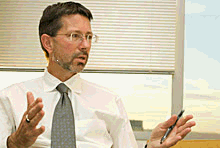
Typical street scene in Santa Ana, El Salvador. (Photo: iStock)
IMF Survey: A More Transparent IMF Quota Formula
February 26, 2007
- Quota should better reflect economic size of member countries
- All members will benefit from IMF reform
- Increase in basic votes will help developing countries
Andrew Tweedie, head of the team in the IMF's Finance Department that is supporting the working group on quota and voice reforms, spoke to the IMF Survey about the status of the work, including the new quota formula and the proposal to increase members' basic votes.

Tweedie: All members—even those whose quotas will not change—will benefit from reforms to make IMF more effective (photo: Michael Spilotro/IMF)
Interview with Andrew Tweedie
IMF SURVEY: Work has begun on the new quota formula. What are the drawbacks of the current formula? Are new variables being considered?
Tweedie: First, there's more than one formula—there are actually five formulas—and the outcome of these formulas is quite complex and nontransparent, which has undermined their credibility. It's very hard for member countries, and even IMF staff who work on this issue, to know in advance what the impact of a change in a key variable will mean. For example, we've seen that it's possible for countries that are growing very strongly—that have a high GDP growth rate—to lose quota shares. Thus, a key objective of this reform is to make the process more transparent.
A second objective is to modernize the variables, which haven't changed much since the institution was founded in the mid-1940s and haven't changed at all since 1983. These variables now need to be updated to reflect current changes in the world economy. So far, the Executive Board has been primarily reviewing the existing variables, but some directors want us to look at new variables, and the IMF staff is now working on that. In the end, I think there will be a significant element of continuity with the existing variables, but hopefully a simpler, more transparent formula that better reflects the economic size of member countries.
IMF SURVEY: How do countries benefit from any quota revision?
Tweedie: The immediate beneficiaries will be countries that get higher quotas as a result of the reform exercise. Once they consent and pay for the increase, they will have a higher quota, which gives them a larger say in decisions and greater access to Fund financing. For other countries, their quotas will stay the same. Given that total quotas will increase, their shares in this total will be somewhat lower, but this will be a proportional decline. This approach, which implies that changes tend to be gradual and measured, has always been used in the past, and helps ensure the acceptability of the changes.
Let me emphasize, however, that all members—even the members whose quotas will not change—will benefit from reforms that make the Fund more effective.
IMF SURVEY: There have been many previous attempts at revising the quota formula, including the Cooper Report. What makes you think it will succeed this time?
Tweedie: One lesson we can draw from the past, including from the Cooper report in 1999-2000, is that it's very difficult to get agreement on a new quota formula in the abstract, that is, in the absence of actually using the formula to change quotas, because members want to know what's in it for them. This time a quota increase will follow the discussions—as agreed by the Board of Governors in Singapore last September. There's also a deadline, which has been made public. And we've already seen some changes involving ad hoc increases for four countries, which were deliberately designed to be modest in scale to keep the incentives in place for the second round.
IMF SURVEY: There's also a proposal to amend the Articles of Agreement to increase members' basic votes. How will this improve the IMF's effectiveness?
Tweedie: All members would get an increase in their basic votes, but the change would heavily benefit low-income countries, many of which are relatively small. As a result, the voice of low-income countries would be strengthened, which is one of the two main objectives of the whole exercise. These countries make up more than half the IMF's membership, with the IMF playing a very active role. This is also a reform that is long overdue. The size of basic votes hasn't changed since the IMF was founded, yet the size of total Fund quotas has been increasing. This change will require an amendment of the Articles of Agreement, so it's a fairly big thing. There have only been four amendments of the Articles in the Fund's history.


